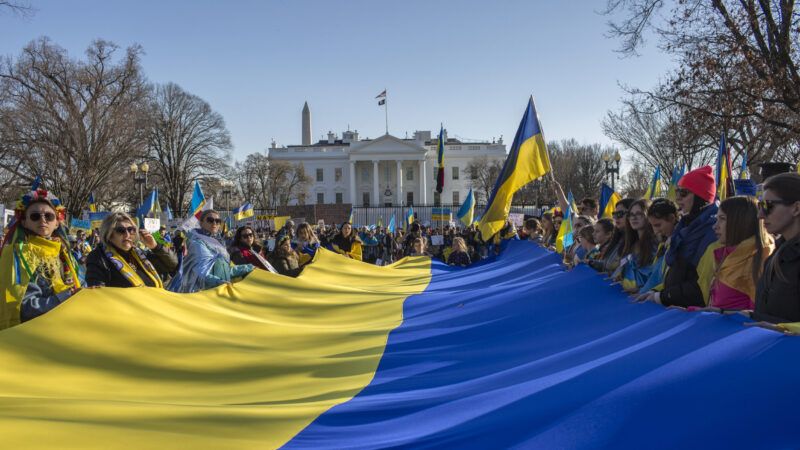Americans Can Now Sponsor Ukrainians for Temporary Refuge in the U.S.
Though the program has flaws, it’s an innovative way for private citizens to get directly involved in resettlement efforts for fleeing Ukrainians.

Over 11 million Ukrainians are believed to have left their homes since the Russian invasion of Ukraine began in late February. Now, American citizens will be able to help the displaced through a new program launched by the Department of Homeland Security (DHS).
Last week, the Biden administration announced an initiative that will allow individuals and entities to sponsor Ukrainians who are seeking temporary refuge in the United States. The initiative, called Uniting for Ukraine, comes as part of the administration's plan to welcome up to 100,000 fleeing Ukrainians. Prospective American sponsors must apply on behalf of Ukrainians and may do so here.
"Ukrainians approved via this process will be authorized to travel to the United States and be considered for parole, on a case-by-case basis, for a period of up to two years," according to the DHS. "Once paroled through this process, Ukrainians will be eligible for work authorization." Those coming to the U.S. must first have a sponsor, complete certain health requirements, and pass screening and security checks. American sponsors must pass background checks and prove they are financially capable of supporting the Ukrainians they intend to sponsor.
President Joe Biden previously announced his intention to welcome up to 100,000 displaced Ukrainians, though the particulars of that plan—such as the specific immigration pathways the administration planned to utilize—were unclear. Notably, there seems to be no upper limit on how many Ukrainians may come to the U.S. under Uniting for Ukraine. Per the DHS, "The number of Ukrainians potentially eligible for Uniting for Ukraine will be driven by the breadth of welcome U.S.-based supporters are willing and able to provide."
As outlined, this initiative provides temporary relief for fleeing Ukrainians rather than a pathway to permanent residency. Approved Ukrainians will receive parole, granting them a two-year stay in the country. In the technical sense, they will not be refugees, who receive certain resettlement benefits and may apply for green cards after one year in the United States.
Some immigration advocates have argued that the new program for Ukrainians is an imperfect solution to America's struggling refugee infrastructure. The Biden administration settled just 11,411 refugees in the U.S. in fiscal year 2021, falling short of its annual cap of 62,500. The pandemic only worsened processing capacities and wait times for applicants. The U.S. refugee program, which is meant to assist the world's most at-risk populations, was ill-prepared to help Ukrainians in their time of need. Government officials seem to be operating under the assumption that Ukrainians are primarily looking for a temporary haven, not a place to resettle in the long term. But this won't be true for everyone who's fleeing, and there's no telling when it will be safe for displaced residents to return to Ukraine.
"This initiative has its flaws," says Matthew La Corte, government affairs manager for immigration policy at the Niskanen Center, "but also comes with the tremendous potential to resettle tens of thousands of refugees from Ukraine in a fast-tracked process driven by community groups across the country."
Uniting for Ukraine will capitalize on the benevolence of private citizens who have been stirred by images of war in Europe and feel compelled to help displaced Ukrainians. "With this new parole program, the American people have the first direct opportunity in the 21st century to show off their welcoming prowess," La Corte wrote last week. "We may very well look back at Uniting for Ukraine as the moment when we planted the seeds for the future of the resettlement program."
Uniting for Ukraine ensures that Ukrainians will arrive in the U.S. already having community connections, ready to benefit from the local knowledge their sponsors hold. "It's a transformational program without caps for sponsors or beneficiaries," says La Corte. "That's the type of creative policy making needed in the face of a historic refugee crisis."

Show Comments (44)